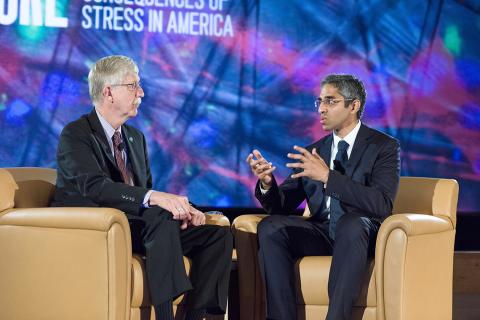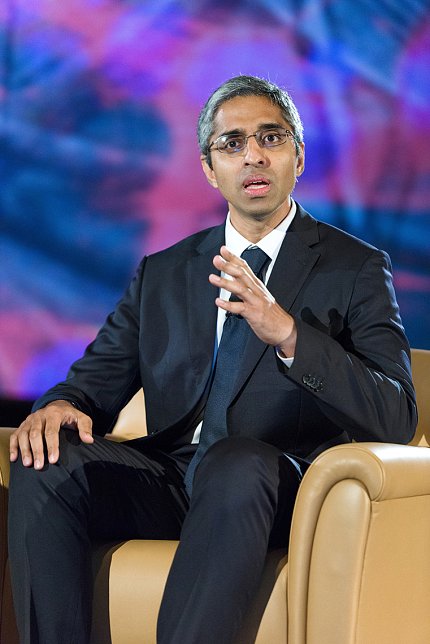Murthy Discusses Chronic Stress, Solutions

Photo: Andrew Propp
Imagine that you are picking up a set of weights at the gym, an overloaded bag at the grocery store or a small child. As you do this, you’re building muscle mass, “but if you hold that weight for hours and hours, it may do damage to you—and that’s essentially what happens with chronic stress,” according to former surgeon general Dr. Vivek Murthy.
There is “an epidemic of stress in America,” he says, but there are also tools and skills that we can use to counter it and “enhance [our] ability to live a healthier, stronger, more fulfilling life.”
Murthy and NIH director Dr. Francis Collins spoke at this year’s Stephen E. Straus Distinguished Lecture in the Science of Complementary Therapies about “A Nation Under Pressure: The Public Health Consequences of Stress in America.” They addressed a packed Masur Auditorium and thousands more watching on videocast and Facebook Live. NCCIH’s annual Straus Lecture honors the center’s founding director.
Not all stress is bad, Murthy said. “We have adaptive mechanisms to it, such as the ‘revving up’ of our epinephrine and norepinephrine. This can be helpful in the short term, like if you have to run from a tiger or respond to an acute crisis. But over the long term, it can increase inflammation in the body and increase our risk of cardiovascular disease, cancer, anxiety, depression and a host of other illnesses.”
During his tenure as surgeon general, Murthy took a “listening tour” across America. The recurring theme he heard was that “the stresses in people’s lives were causing them great pain and they didn’t always know how to deal with them...It was so powerful to see how people would react and come together when we talked about stress and emotional well-being.” As a nation, “if we are not addressing stress and emotional well-being, we are missing a major contributor to our health.”
The data suggest that stress levels have been increasing, both speakers said, with Collins calling stress “a national affliction” and Murthy citing two major causes—“the shift to a more relentless, 24/7 work culture” and “a change in social engagement and interaction.
“Our world, and our country in particular, are full of people with thousands of friends on Facebook and Twitter who live in densely populated condo buildings and busy cities, who are profoundly alone,” Murthy said. “In one survey, one-quarter of the respondents said they didn’t have a single person they could confide in about a personal problem.” Social media cannot replace in-person connections, he added, and can actually make us feel worse when we compare ourselves to what is really “a fictionalized or partial version of others’ lives.” Money challenges, relationship/family issues and health problems also pile on the stress. Is there a way to lighten the load?
Murthy emphasized social connection, including reaching out in the workplace. However, other tools offer support, too. “Sleep is when our brain regenerates and forms memories and our body tissues heal. When we don’t sleep enough, it impairs our ability to make decisions, learn and heal and hormonal disturbances occur.” Collins added, “You lose your sense of wanting to be creative-—you just want to get through the day. For an institution like NIH, where our future depends on our creativity, this [sleep-deprivation situation] is the wrong thing, but it seems to happen too often.”

Photo: Andrew Propp
Meditation “has been shown to be incredibly important and helpful when it comes to stress, [but] sometimes gets subjected to misconceptions and stereotype,” Murthy continued. “I have often said that meditation has a serious branding problem, because people think you’re talking about an Indian yogi sitting cross-legged on the floor for hours and hours.
“Over time, we have learned that meditation can be powerful in inducing a relaxation response,” Murthy added. It’s being used more and more in the Veterans Administration health system, including with post-traumatic stress; a growing number of meditation programs are cropping up across the country, including in schools. The benefits that educators report, he said, include better academic performance, improved behavior, fewer suspensions and lower teacher absenteeism. “Like all things,” Murthy said, “prevention is better than cure if we can get there early enough. Getting to kids early [with skills to handle chronic stressors] is, to me, the most important form of prevention.”
When discussing research on the biological effects of meditation, Murthy said, “There is not as much research, or high-quality research, on meditation as on other interventions like medications for diabetes or hypertension...but we have what I believe is a significant amount of data and anecdotal experience to tell us that something real here is happening and there’s reason to invest more in this research. What we cannot afford is to allow the typical 7, 10 or more years for a proven intervention to percolate through into clinical practice.” He urged that the entire array of anti-stress tools be viewed with an eye to wherever they could be used. More awareness in the public and among policymakers of the stress problem, and even “a major cultural shift in how we think about and address stress,” may be needed.
Other anti-stress approaches that Murthy and Collins discussed include regular exercise, “which is far more important than we understood and can function as an acute and chronic antidepressant.” They also touched on music, with Collins referring to NIH’s partnership in the Sound Health initiative and Murthy noting music’s “powerful ability to change how we perceive the world and to activate the relaxation response.”
Finally, they urged attendees to pay more attention to self-care. Murthy entreated health care providers specifically: “We’ve all seen those old cartoons of doctors telling their patients not to smoke, while they’re smoking themselves. We’re doing that with stress-—we’re telling people to relax and take it easy, get sleep, etc., while we ourselves as clinicians are running ourselves ragged and paying no attention to the profound impact. We need to lead by example and to change the culture in the country, starting with our own culture of medicine.”
Murthy urged listeners to be concerned not only about their own stress, but also that of others. “When someone deals with emotional trauma and stress and it results in acts of violence, it affects all of us. When we have unchecked stress leading to greater levels of addiction in our country, that affects all of us. When stress and emotional discord prevent us from being able to come together and talk about big problems and come to solutions—that, too, affects all of us. We have to think about how we can help to [relieve] stress for people around us...Reaching out to build connections based on compassion and kindness can have a profound effect.”
The full lecture is available at https://videocast.nih.gov/Summary.asp?Live=24968&bhcp=1 and https://www.facebook.com/nih.nccih.
